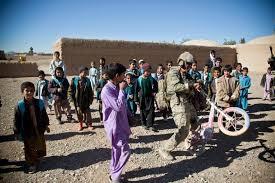TerrorismISIS child suspects arbitrarily arrested, tortured by Iraqi, Kurdish govs.
Human Rights Watch estimates that Iraqi and Kurdish authorities are holding in detention approximately 1,500 children younger than 17 years of age for alleged ISIS affiliation. Many of these children, some as young as 11 years old, have been tortured. At least 185 foreign children have been convicted on terrorism charges and sentenced to prison terms, according to Iraqi government authorities.

Report: Iraqi and Kurdish authorities routinely arrest children suspected of ties to ISIS // Source: dodlive.mil
Iraqi and Kurdistan Regional Government authorities have charged hundreds of children with terrorism for alleged Islamic State (also known as ISIS) affiliation, Human Rights Watch said in a report released today. The prosecutions are often based on dubious accusations and forced confessions obtained through torture.
HRW says that the 53-page report, “‘Everyone Must Confess’: Abuses against Children Suspected of ISIS Affiliation in Iraq,” shows that Iraqi and KRG authorities often arrest and prosecute children with any perceived connection to ISIS, use torture to coerce confessions, and sentence them to prison in hasty and unfair trials. International law recognizes children recruited by armed groups primarily as victims who should be rehabilitated and reintegrated into society.
“Children accused of affiliation with ISIS are being detained, and often tortured and prosecuted, regardless of their actual level of involvement with the group,” said Jo Becker, children’s rights advocacy director for Human Rights Watch. “This sweeping, punitive approach is not justice, and will create lifelong negative consequences for many of these children.”
Iraqi children who have been arrested for suspected ISIS involvement say that once released, they are afraid to go home because their arrest automatically brands them as ISIS and makes them vulnerable to revenge attacks. Children detained by the KRG said they feared re-arrest by Iraqi federal forces if they return to Baghdad-controlled territory. This stigma can lead to permanent separation from their family and community.
Iraqi and KRG authorities use deeply flawed screening processes that often lead to detention and prosecution of children regardless of whether they have any involvement with ISIS, or the extent of that involvement. A 17-year-old detainee, for example, said he worked at a restaurant in Mosul that served ISIS members, and believed that his name appeared on a “wanted” list because ISIS took his identification so he could be paid.
Others might have the same name as an ISIS suspect. In many cases, neighbors report individuals for ISIS involvement with little or no evidence, or because of personal grievances.
